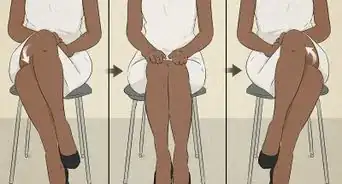This article was co-authored by Jennifer Guttman, PsyD. Dr. Jennifer Guttman, is a Cognitive Behavioral Therapist, Clinical Psychologist, and the Founder of the Sustainable Life Satisfaction®, a motivational and lifestyle platform. With over 30 years of experience and practice in New York City and Westport, Dr. Guttman specializes in treating people struggling with acute behavioral disorders stemming from anxiety, depression, stress, attention deficit, and phobias. She holds a Bachelor’s degree in Psychology from Drew University and a Doctor of Psychology from Long Island University. Dr. Guttman is the author of "A Path To Life Satisfaction Workbook (2018),” a monthly blog contributor to Psychology Today and Thrive Global, and a contributor to articles in major publications, media sites, and podcasts including The Washington Post, Reader's Digest, Redbook, Teen Vogue, Health, mindbodygreen.com, Harvesting Happiness, and Unshakable Self-Confidence.
This article has been viewed 20,291 times.
An inability to gracefully receive gifts and compliments often comes from a negative sense of self-worth, a distrust of others, or a fear of being perceived poorly by others. Sometimes, all three factors are at work inside your subconscious. You'll need to change the way you think about the act of receiving while improving the way you react upon receiving something.
Steps
Part One: Improve Your Ability to Receive
-
1Accept your own worth. To become better at receiving, you'll need to accept the fact that you are just as worthy of receiving as anyone else is. Accept that the ability to receive is not a selfish or conceded attribute.
- At a more basic level, you'll need to remove yourself from the giving-receiving dichotomy and learn to accept yourself simply for being who you are. You are enough, no matter how much you give or how much you receive.[1]
- Writing daily self-affirmations can help you feel more worthy and deserving overall.
-
2Be honest about what you want. Ask yourself what it is that you really want. Identify any fears that hold you back from receiving your desires, then work on releasing those fears so that you can embrace your desires more fully.[2]
- Specifically label the fears that prevent you from receiving. For instance, if you fear that you aren't talented enough to find success or beautiful enough to love, identify that fear and argue against it. You won't be able to accept the gifts you want unless you can first remove the lies saying you don't deserve them.
Advertisement -
3Examine yourself as a giver. Determine whether or not you truly give to others with an open heart. If you are able to give freely, it will be easier for you to embrace the related practice of receiving freely.
- Think about the gifts you typically give to others and ask yourself what motivates you. If you give out of a sense of obligation or superiority, your heart is probably in the wrong place. Similarly, if you expect to receive each time you give, you'll need to learn how to give without clinging to the hope of receiving.
- Make a habit of giving to others. Offer praise without expecting it in return. Show consideration without wishing to be acknowledged for it. Once you learn to give openly, you'll be able to accept that others can give to you openly, as well.
-
4Consider the different gifts you receive. There are many different types of gifts you will receive in your life. Some will be tangible, while others are more abstract. By identifying the different types of gifts you'll receive, you can prepare yourself to accept each type more thoroughly.
- Tangible gifts are usually rather obvious and include things like presents, money, and greeting cards.
- Abstract gifts might be less obvious, though. They include things like compliments, words of support and encouragement, acceptance, a listening ear, and advice.
Part Two: Train Your Mind
-
1Identify and accept your inherent gifts. Identify one quality of yours that you feel pleased about. While meditating on that quality, practice saying “thank you” for it out loud.[3]
- The quality you identify can be something you were born with, like a great smile, or something you developed, like a good sense of humor.
- Tell yourself, "thank you for having a great smile" or "thank you for having a great sense of humor."
- You might feel bashful, depressed, or angry with yourself at first. Push beyond these self-judgments, though, and continue to repeat to yourself, "thank you for this gift."
- Repeat this exercise until the judgments stop and you can honestly feel pleased and thankful for the gift you've identified.
-
2Practice thanking someone for a tangible gift. Find a physical gift that someone has already given to you. While holding onto that gift, practice saying “thank you” for it until doing so feels natural.
- This gift should be something you can physically hold or touch. Look at it, feel it in your hands, and say, "Thank you for this gift. I accept it."
- As before, you might begin to feel guilty, angry, or depressed as you think about having received this gift. Continue to repeat this exercise until these negative judgments end, leaving only gratitude in their place.
-
3Practice thanking someone for an abstract gift. Think of a sentiment or other abstract gift someone has already given to you. Focus on that gift in your mind, then practice saying “thank you” for it until gratitude overrides any other sentiment.
- This time, the gift must be something you cannot physically hold onto. It can be a compliment, the gift of reassurance, or something similar. The idea is to choose a sentiment-based gift so that you can learn to accept the love behind the gifts you receive.
- Think of the gift and, as before, say "Thank you for this gift. I accept it." Repeat the exercise until your gratitude overwhelms all of the negative emotions might initially experience.
Part Three: Receive Gracefully
-
1Verbalize your gratitude. When receiving a gift of any kind, you should absolutely tell the giver “thank you” for it.[4]
- "Thank you" is the best response you can offer no matter what you receive. Expressing thanks demonstrates your desire to accept the gift, compliment, or sentiment while still being humble about it.
- If simply saying "thanks" feels awkward to you, follow the phrase with a secondary phrase that continues to express gratitude. Try something like, "I appreciate the compliment," or, "That's very thoughtful of you."
-
2Receive with open body language. Your nonverbal response is just as important as your verbal response. At minimum, you should receive the vast majority of gifts with a smile.
- Smiling indicates happiness, and the point of any gift is to make the receiver happy. Smiling when you receive something allows the giver to know that the gift was appreciated, regardless of whether the smile is shy and polite or huge and enthusiastic.
- Aside from smiling, you should also do things like maintaining eye contact and leaning in toward the giver. Even if you feel uncomfortable, you should avoid crossing your arms, looking away, or appearing disinterested.
-
3Resist the urge to deny the gift. If you have a hard time receiving, your natural reaction might be to deflect or reject a gift that is offered to you. Doing so is actually more likely to cause a negative reaction than receiving the gift would cause, however.
- Put yourself into the giver's shoes and think of how it feels when someone denies a compliment or suspiciously rejects a gift. Most people will either be saddened when they realize the receiver doesn't know his or her own value, or frustrated by the implication that the gift or sentiment was somehow dishonest.[5]
-
4Don't get carried away. It is also possible, of course, to seem conceited when you receive something. Failing to express genuine gratitude may make you appear egotistical, which can also cause a negative response from the giver.
- Appearing egotistical can usually be avoided as long as you stick to the standard “thank you” script. You should still avoid following your thanks with words of self-promotion, though. For instance, if someone compliments your appearance, avoid replying with, “Thanks; I get that all the time,” or, “Thanks; I know.”
-
5Give credit where credit is due. A fair, appropriate way to demonstrate humility when you receive something like a compliment or a reward is to acknowledge others who put you into a position to receive the gift.
- For instance, if you receive a compliment about a project that was successfully completed as part of a team effort, tell the giver something along the lines of, "The entire team put in a lot of effort, and it wouldn't have been possible without everyone's input. Thank you for acknowledging us."
-
6Follow the appropriate protocol. Depending on the situation, it might be socially appropriate to follow up with a more formal thanks or return gift. This principle won't always apply, but following it when convention deems it appropriate can help you feel more comfortable with the gift you received.
- This is a big issue to consider when receiving gifts for formal occasions, like weddings and baby showers. As you receive the gift in person, a quick “thank you” is appropriate. Later on, you should also follow up with a more formal thank you note acknowledging the gift in greater detail.
-
7Avoid competing with the giver. No matter what the circumstances are, you should never turn the practice of giving into a competition. Giving and receiving are two sides of the same action, and there is no shame in being on either side of that action.
- This can be especially tempting when receiving compliments. If someone compliments your work, don't return the praise by offering higher praise. For instance, you shouldn't reply with, "Thank you, but you could've done a better job." Even if you believe such a statement, it is best to accept the praise without argument.
References
- ↑ http://tinybuddha.com/blog/learning-to-receive-5-steps-to-opening-up/
- ↑ http://inspacesbetween.com/insights-inspiration/how-to-open-yourself-up-to-receiving-more-in-your-life/
- ↑ http://www.oprah.com/spirit/Martha-Beck-Why-Its-Harder-to-Receive-Than-to-Give
- ↑ http://www.entrepreneur.com/article/234668
- ↑ http://youqueen.com/life/personal-development/how-to-gracefully-accept-compliments-a-step-by-step-guide/
About This Article
To receive gifts gracefully, try saying something like, “That’s so nice of you. I really appreciate it,” to express your gratitude. It might be tempting to deny the gift if you feel like you don’t deserve it, but always accept it, since this will make the other person feel better. When you thank the person, smile and make eye contact with them to show that you’re pleased with their gift. If you know them well, you can offer them a hug too. Similarly, if someone pays you a compliment, smile and say, “Thank you.” You should also avoid rejecting the compliment, since this might insult the other person. For more tips, including how to practice saying thank you, read on!



































































